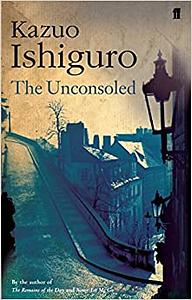Take a photo of a barcode or cover
challenging
mysterious
sad
slow-paced
Plot or Character Driven:
Character
Strong character development:
No
Loveable characters:
Complicated
Diverse cast of characters:
No
Flaws of characters a main focus:
Yes
Bleary and vague, dreamlike and surreal. What an interesting book that answered very few questions and truly left the characters and myself Unconsoled
challenging
emotional
mysterious
reflective
slow-paced
Plot or Character Driven:
Character
Strong character development:
Complicated
Loveable characters:
No
Diverse cast of characters:
Yes
Flaws of characters a main focus:
No
Almost every character in this book is dislikable.
Why? I think Ishiguro comments on the inherent precariousness and widespread narcissism of the art world. The city's "crisis" is entirely self-inflicted, argued into existence by a public that doesn't really care about art's technicalities and really only cares about the fact that things are happening in their town. At the very end, one of the characters remarks that the townsfolk really don't know sh*t about art. So, why have they been the chief judiciaries of artistic merit? The people of the town don't even have the technical wherewithal to form educated opinions, yet why are they held to tastemaker status? The relationship between Stephan and his parents is a perfect microcosm of this enigma.
Ishiguro doesn't valorize artists either; artists are just as flawed as the laymen who masquerade as experts. Brodsky is a self-indulgent drunk, Christoff is an uncompromising traditionalist, but Ryder is by far the most egregious example of the narcissistic artist. He constantly, repeatedly values his needs over others, telling them how his role in the town's crisis is so much more important than whatever issue they might have at the moment. He expects people to recognize him and his mission immediately. He revels his lofty status amongst the art circles of the city, taking pleasure in the fact that his words become tantamount to popular opinion. Ryder needs to be in control; on various occasions, he explodes in tantrums when people don't listen to what he has to say.
The artists and critics of the art world are caught in a vicious, toxic ecosystem where former and latter both need each other to survive. The artists need public opinion to be in their favor, resting on an artistically uneducated populace, thus betraying artistic merit to whims and follies of human nature. The people of the town turn on Mr. Christoff because his work becomes familiar. They evaluate Brodsky's ouvre not by the works themselves but by how drunk he is. The critics need artists to produce works that are both groundbreaking yet digestible and familiar, a nigh impossible task. It's as if artist and critic are stuck in a dream where they have little control of their movements and recognition. I think this is why Ishiguro's novel takes its form: Ryder is simultaneously a victim and perpetrator of a poisonous ecosystem. And as such, artists and art critics are both victims and perpetrators just the same.
The only individuals without the flaw of self-importance are the people not in proximity with the art world: Gustav, Sophie, Boris, Miss Collins, and Stephan (who, while an artist himself, can be argued to not be a part of the art world as he is but a fledgling artist). Yet, they too are the constant victims of emotional neglect from the art world narcissists in their lives.
Perhaps, then, this book is a cry by Ishiguro in hopes to escape that ecosystem, to point out that the art world is built on uncertain pillars by uncertain architects. Perhaps it is a meta commentary that both artist and critic could benefit by taking themselves not so seriously.
But I dunno. That's just a theory.
Why? I think Ishiguro comments on the inherent precariousness and widespread narcissism of the art world. The city's "crisis" is entirely self-inflicted, argued into existence by a public that doesn't really care about art's technicalities and really only cares about the fact that things are happening in their town. At the very end, one of the characters remarks that the townsfolk really don't know sh*t about art. So, why have they been the chief judiciaries of artistic merit? The people of the town don't even have the technical wherewithal to form educated opinions, yet why are they held to tastemaker status? The relationship between Stephan and his parents is a perfect microcosm of this enigma.
Ishiguro doesn't valorize artists either; artists are just as flawed as the laymen who masquerade as experts. Brodsky is a self-indulgent drunk, Christoff is an uncompromising traditionalist, but Ryder is by far the most egregious example of the narcissistic artist. He constantly, repeatedly values his needs over others, telling them how his role in the town's crisis is so much more important than whatever issue they might have at the moment. He expects people to recognize him and his mission immediately. He revels his lofty status amongst the art circles of the city, taking pleasure in the fact that his words become tantamount to popular opinion. Ryder needs to be in control; on various occasions, he explodes in tantrums when people don't listen to what he has to say.
The artists and critics of the art world are caught in a vicious, toxic ecosystem where former and latter both need each other to survive. The artists need public opinion to be in their favor, resting on an artistically uneducated populace, thus betraying artistic merit to whims and follies of human nature. The people of the town turn on Mr. Christoff because his work becomes familiar. They evaluate Brodsky's ouvre not by the works themselves but by how drunk he is. The critics need artists to produce works that are both groundbreaking yet digestible and familiar, a nigh impossible task. It's as if artist and critic are stuck in a dream where they have little control of their movements and recognition. I think this is why Ishiguro's novel takes its form: Ryder is simultaneously a victim and perpetrator of a poisonous ecosystem. And as such, artists and art critics are both victims and perpetrators just the same.
The only individuals without the flaw of self-importance are the people not in proximity with the art world: Gustav, Sophie, Boris, Miss Collins, and Stephan (who, while an artist himself, can be argued to not be a part of the art world as he is but a fledgling artist). Yet, they too are the constant victims of emotional neglect from the art world narcissists in their lives.
Perhaps, then, this book is a cry by Ishiguro in hopes to escape that ecosystem, to point out that the art world is built on uncertain pillars by uncertain architects. Perhaps it is a meta commentary that both artist and critic could benefit by taking themselves not so seriously.
But I dunno. That's just a theory.
challenging
mysterious
slow-paced
Plot or Character Driven:
Character
Strong character development:
Complicated
Loveable characters:
No
Diverse cast of characters:
No
Flaws of characters a main focus:
Yes
Intensely dreamlike while managing to stay grounded
challenging
funny
mysterious
medium-paced
Plot or Character Driven:
N/A
Strong character development:
Complicated
Loveable characters:
Complicated
Diverse cast of characters:
No
Flaws of characters a main focus:
No
lighthearted
mysterious
tense
medium-paced
Ishiguro is a really good writer, and I appreciate what he does, not just here, but in other books as well, to keep readers on our toes. But while I don’t think everything needs to be wrapped up nearly at the end, I would have liked just a few answers.
I don't know what to think or feel... What a weird book. Y'know how some people say something's a "comfort book." this is an "uncomfort book." It's like one long stress dream. But I was glad to see the main character get to sit down and take his time and eat a big breakfast with a stranger who is actually a stranger for once, at the end. More books should end with a big delicious breakfast.
challenging
reflective
tense
slow-paced
Plot or Character Driven:
Character
Strong character development:
No
Loveable characters:
No
Diverse cast of characters:
Complicated
Flaws of characters a main focus:
Yes
I could only handle this book in small doses. Its dream-like and illogical quality was anxiety-inducing, but I was fascinated to behold Ishiguro’s craft and effortless intentionality at the same time.
I've got absolutely no idea whether this book is total genius or complete nonsense.
I couldn't even tell you what this book is about.
(At a stretch, I would guess it's about the free associative nature of the brain and the logic of dreams - and moreover about an attempt to put one's personal history together into a single cohesive narrative. But that's quite a stretch I think.)
But it propelled me through and I had a wonderful time reading it. And I think that's enough.
I couldn't even tell you what this book is about.
(At a stretch, I would guess it's about the free associative nature of the brain and the logic of dreams - and moreover about an attempt to put one's personal history together into a single cohesive narrative. But that's quite a stretch I think.)
But it propelled me through and I had a wonderful time reading it. And I think that's enough.






